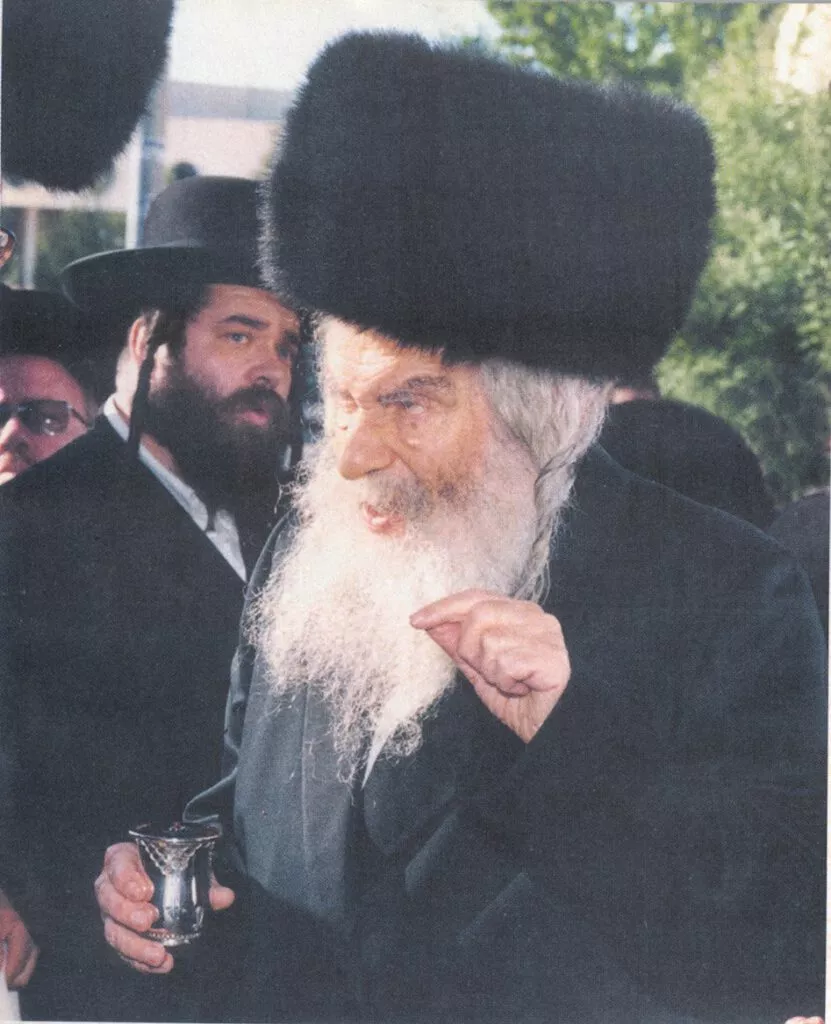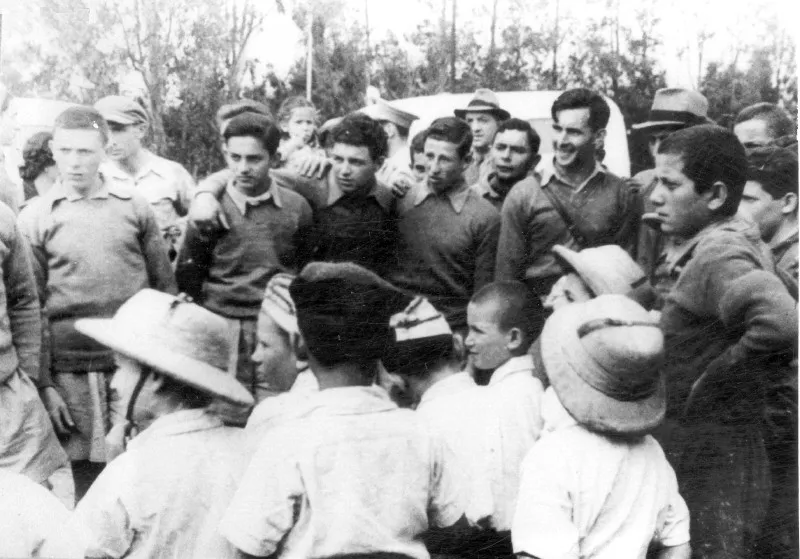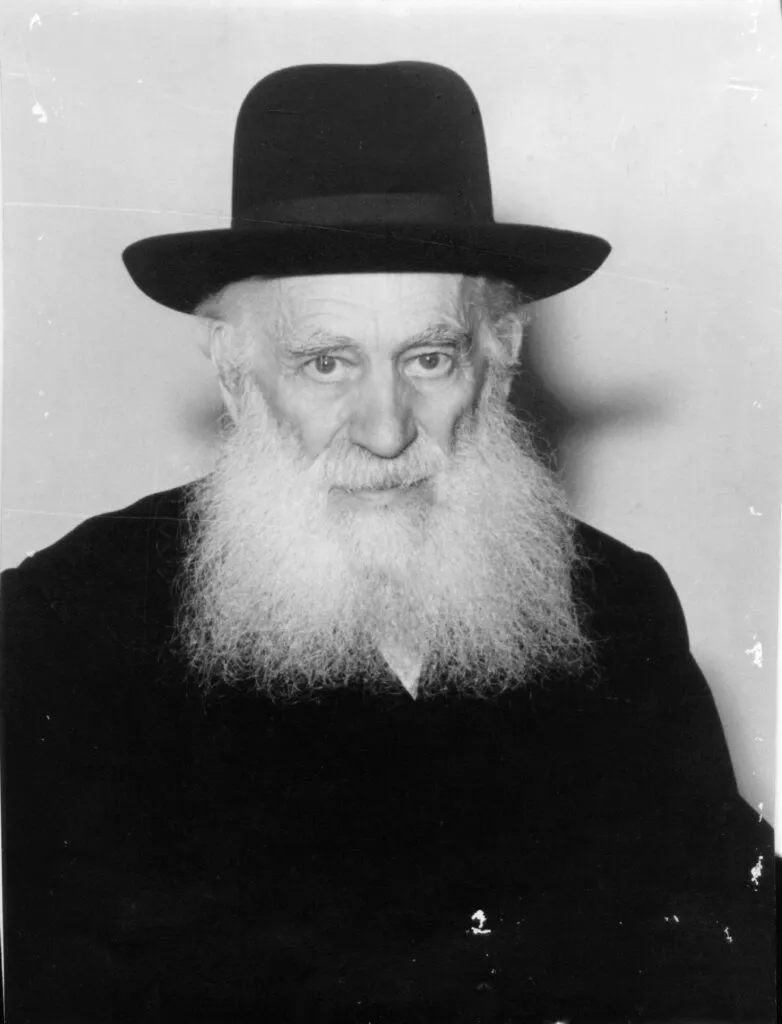5703-5783 (1943-2003) – Eighty Years Since the Aliya of the Tehran Children
Ganzach Kiddush Hashem’s special project – A series of essays, articles, memories, and diary excerpts
First essay in the series – The memories of the Pnei Menachem, the Gerrer Rebbe, from the time he spent in the Ponevezh Home for the Elderly, Tamuz-Av 5703 (Summer 1943), in the presence of the Ponevezher Rebbe and the Tehran Children.
With thanks to HaMevaser newspaper and the writer Rabbi Yekutiel Yehuda Genzler for the quality essay.
The Rabbi’s Son
It was in the summer months of the year 5703 (1943), and our Rebbe, the Pnei Menachem, was then a young man about the age of 17. In those days our Rebbe suffered from asthma which tormented his breathing, and he even contracted severe sinusitis, which only made it even more difficult for him. The doctor that examined him advised him to stay in the seaside area, explaining that the humid air would do its job for the health of the rabbi’s eldest son. The rebbetzin (rabbi’s wife) entered, and gave over the doctor’s words with the request that the rabbi’s son would indeed go to stay in a place that would promote his recovery.

The Pnei Menachem, the Gerrer Rebbe, at a wedding
The Rebbe, the Imrei Emet, summoned his eldest son and and instructed him: “I have a good friend in the city of Bnei Brak, the Ponevezher Rebbe. I will send you to him, learn Torah from him. And every morning, when you wake up, go on a trip to the beach in Tel Aviv to breathe air and recover, at an early hour. This is when there are still no people visiting the beach.”
In the boarding school building, which was built by the Ponevezher Rebbe during those years, the Tehran Children were housed during the period in question. These were child Holocaust refugees who arrived in Tehran, Iran and were brought to Israel. Here the state officials seized the children and directed them to the kibbutzim, where they were separated from the religion of their ancestors who were sacrificed in their blood on the Nazi altar.

The Tehran Children in Israel, at the end of their journey
The elders of the Jewish people then waged a steadfast struggle for the souls of these children, and were only partially successful, when a few dozen of the children were transferred to stay in the boarding school building established by the Ponevezh Rebbe in Bnei Brak, as part of his great dream of establishing a large yeshiva for Torah students.
One of the instructors at the boarding school was his friend, Rabbi Chaim Mandel z”l, who was a young man at the time. One day, Rabbi Chaim received a letter addressed in the handwriting of the late Rabbi Pinieh Levin, who announced that the Rebbe’s son needed to stay in an area with humid air in Gush Dan, and asked that Rabbi Chaim be a host and friend to the Rebbe’s son, and as Rabbi Chaim himself told years later: “Of course I happily accepted and had the honour of being greeted by ‘the Rebbe’s son’… Dem Rabi’nes a Kind (the Rebbe’s son) was an exalted and sacred concept for me. In general, anyone who had the privilege of witnessing the iconography of our Rebbe, the Imrei Emet, understood well what the term ‘rabbi’s son’ means…”
This is how our Rebbe appeared in the city of Bnei Brak, for a recovery stay.
It was not the first time that our Rebbe, the Pnei Menachem, met the Ponovezher Rebbe.

Rabbi Yosef Shlomo Kahaneman – Head of the Ponevezh Yeshiva
At the beginning of the World War, the starting period of the arrival of the Imrei Emet to Israel, the Ponevezher Rebbe used to frequently stay at the Babad (Beit Avot Bnei Din, Sons of the Heads of the Jewish Court) Hotel, where he lived at that time as the Beit Yisrael rabbi. The Ponovezher Rebbe used to pray at the first service in the morning, in the hall of the Sfat Emet yeshiva. Our Rebbe, the Pnei Menachem, was a young man at the time, and his older brother, the Beit Yisrael, would turn his attention to his guests and the Ponevezher Rebbe.
“Pay attention to his example,” said the Beit Yisrael to his younger brother, the Pnei Menachem, “that the Ponovezher Rebbe does not take off his shoes when he goes to the pulpit to bless the people of Israel with love near the Holy Ark, as is the way of the kohanim (priests); He takes off his shoes on the side of the western wall of the synagogue, as he walks barefoot to the pulpit in the east. All of this is due to the honor of the Beit Midrash, to fulfill the commandment ‘And My temples shall be seen.'”
“Note that whenever he is called to come up to the Torah, first, he makes sure to express his gratitude to the gabbai (the one who is in charge of the service) who announces and greets him with the blessing of ‘yasher koach'”. And the Beit Yisrael said: “Pay attention to these things, because from every movement of the Ponevezher Rebbe, you can learn just like you can from a living Shulchan Aruch (Code of Jewish Law)…”
Excitement took hold of our Rebbe now, when the Ponevezher Rebbe was warmly welcomed into the shadow of his roof, as he took pains to take care of all his needs, and even assigned him a special room, on the ground floor of the yeshiva that was being built. In particular, the Ponevezher Rebbe made sure that his young guest did not overexert himself, but rested properly to recover his body until he returned to us.
Two who held the “Horayot” (Decisions)
The sublime hours during those days of recovery were the hours when our rabbi sat and studied in private fellowship with the Ponevezher Rebbe, who, out of the belovedness of our rebbe, established this daily study framework with him. Together they studied the Tractate of Horayot (Decisions), Gemara, Rashi and Tosfot, in great depth.
During those hours of study, the Ponevezher Rebbe did not resemble a head of a Lithuanian yeshiva, but rather a chasidic genius who studies in the “Polish style”, when he often offered piles of difficulties and excuses, explanations and quibbles, in the way of study that was accepted in Polish yeshivas (started by Rabbi Yaakov Polack, known as the Baal Hachilukim, arguments for the sake of Torah learning). One day, Rabbi Chaim Mandel heard the different teaching style of the Ponevezher Rebbe, and commented with holy reverence: “Isn’t the Gerrer Rebbe’s son also a student of the geniuses Rabbi Chaikel Miletsky z”l and Rabbi Sharaga Feivel Frank z”l, the best scholars in Jerusalem, and if so he is also well versed in the traditional teaching method of the Lithuanian yeshivas…” The Ponovezher Rebbe answered: “Not only for the sake of the Rebbe, I study this, but from myself I also study in the style of the Polish and study with argumentation, according to the words of Kohelet the son of David (King Solomon): ‘Hold on to it, and do not lay your hand on it either.'”
Rabbi Yona Sheinbach, one of the dignitaries of the Strykov Holy Court, heard the description of that daily study from the mouth of our Rebbe. It was when our rabbi appeared to visit the Strykover Rebbe, and on his way he passed by students of the Kollel (yeshiva for adults), including those learning. Our Rebbe asked in which yeshiva these young men studied in their youth, and the Strykover Rebbe replied that most of the students were graduates of the venerable Ponevezh Yeshiva. Our Rebbe turned to the elders saying: “You studied in Ponevezh, I also studied in Ponevezh, my father sent me to study there because of the weather. I studied there in the company of the Ponovezher Rebbe, in the serious tractates of Seder Kodashim (Holy Things), he gave over his idea and I sat opposite him and wrote whole notebooks”…
“I was most amazed then”
The seventeenth of Tammuz fell that year on Shabbat, and the fast was postponed to Sunday. However, the Ponevezher Rebbe instructed our Rebbe that he still had the ruling of a sick person, and forbade him to fast on the fast day. However, towards Tisha B’av, our Rebbe came to appear before the Ponevezher Rebbe and begged him not to order him not to fast, since it would be for him “a decree that he cannot comply with.” In a hurry, the rabbi allowed our Rebbe to fast on the day of the destruction of our temple.
Throughout his life, our Rebbe would tell about what he saw during the meal preceding the fast of Tisha B’Av, when the Ponevezher Rebbe, the extraordinary genius, was with the children of Tehran, oppressed refugees, and told themHolocaust stories with special tangibility. He descended from the height of his understanding and stooped down to the understanding of the children, who did not get to learn and know too much, and explained the stories and explanations to them in detail. “I was most amazed at the time” – emphasized our Rebbe – “of the genius ability of the Ponevezher Rebbe, to descend from his spiritual heights to the almost childish level of the boys”.
Our Rebbe would also describe the conduct of the Ponevezher Rebbe in those years, before the yeshiva was established, when he already conducted himself as one who had a yeshiva of hundreds of students. He has already prepared, built, and planned the yeshiva for thousands of students, in his great vision which had indeed arisen and would be created before the eyes of all Israel.
Separation Gift
At the end of the summer, after there was a real improvement in his health, our Rebbe said goodbye to the Ponevezher Rebbe and his friend Rabbi Chaim Mandel, and returned to the holy place in Jerusalem. When Rabbi Chaim Mandel said goodbye, our Rebbe asked: “What can I give you as a parting gift?”. Rabbi Chaim asked to receive the letter that our Rebbe received from his father at that time, in which he stated: “Regards to your friend Chaim Mandel.” He asked for it and he received it.
When our rabbi parted ways with the Ponevezher Rebbe and thanked him with all his heart, the Ponevezher Rebbe refused to accept his thanks: “I don’t deserve any thanks!” He said, “Isn’t your father a good friend of mine, and that’s simply how you should treat the son of an old friend who comes under your shadow.” Even later, when the Imrei Emet sent him a special gift, the Ponevezher Rebve refused to accept it with the same argument: “Isn’t The Gerrer Rebbe my good friend, and who doesn’t behave like me when the son of a true friend comes to him?”
When our Rebbe returned to his father’s house, the Imrei Emet, his father, was interested in details about all the days of his stay under the shadow of the Ponevezher Rebbe, as he was interested in his ways, and noted: “You had to thank him with the blessing of yasher koach, also in my name.”
“My teacher and my rabbi, my master and my informer”
This is what our Rabbi said in one of his rare sermons in the sanctuary:
“I will neither distort nor exaggerate a thing, if I call the Ponevezher Rebbe ‘my teacher and my rabbi, my master and my informer.’ Apart from the Torah I received from his mouth, literally and figuratively, I also studied with him in the manner of ‘the use of Torah’, as the Sages say (Barchot 7:2) ‘she is bigger than her studies.’ I learned a lot of ‘yeshiva laws’ then from him. Even when I was appointed head of the Sfat Emet Yeshiva, my mother, the rebbetzin, ordered me to go to Bnei Brak and talk about it with the Ponevezher Rebbe. I was greatly influenced by the courage of his spirit to restore the ruins after the great destruction, and to build everything anew, just as my holy father the Imrei Emet said to Belzer Rebbe, Rabbi Aharon, at their first meeting in the Land of Israel: ‘Men dorfen anhoiben fun dos nei (we must start over).’ And all the days after that I see his supreme figure triumphant before me…”














